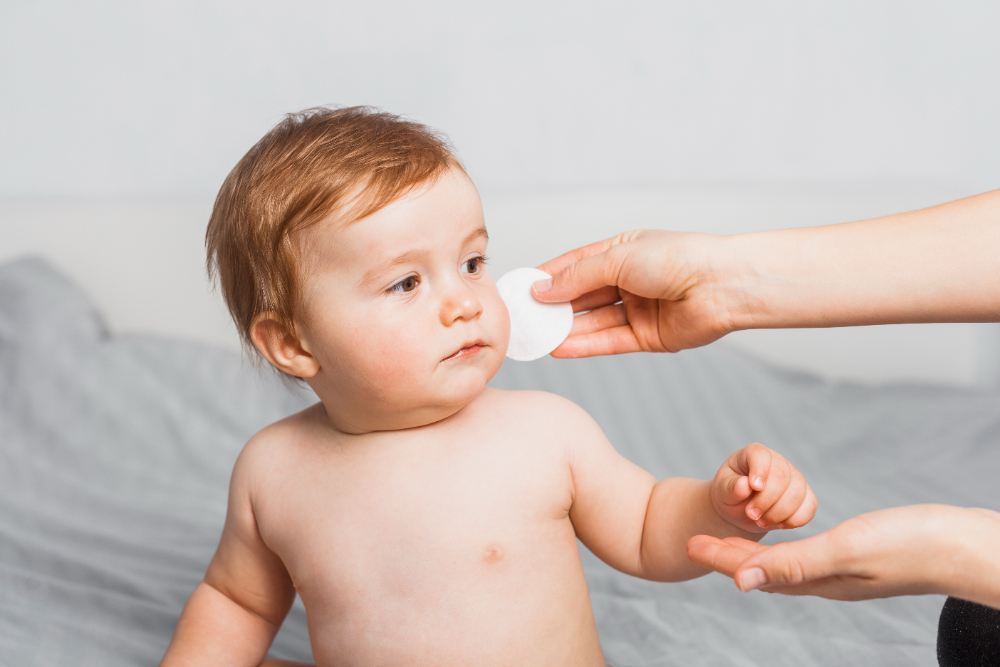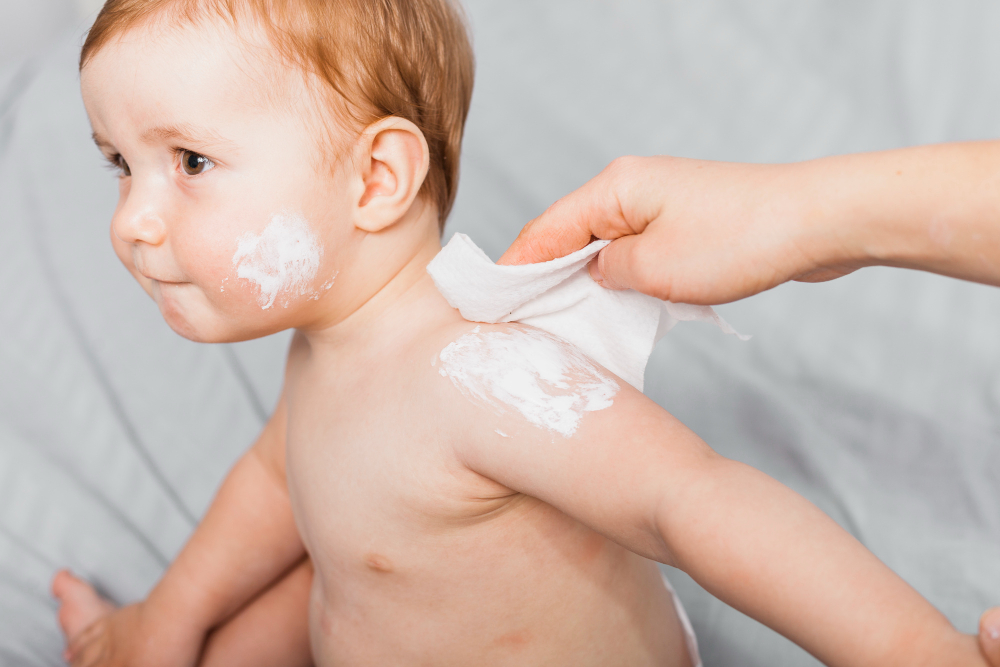A baby’s skin is incredibly delicate and sensitive due to its thin structure and developing protective barrier. Unlike adult skin, it lacks the natural oils and resilience needed to fend off irritants. This sensitivity makes it prone to dryness, irritation, and skin conditions such as eczema and rashes. Understanding these characteristics is essential for providing the right care.
Recognizing the Signs of Sensitive Skin
Sensitive skin isn’t always obvious. Here are some telltale signs to look for:
- Redness or Rash: Unexplained redness, particularly in areas that rub against clothing.
- Dry or Scaly Skin: Patches of flaky or rough skin.
- Reactions to Products: Irritation after using a new lotion, soap, or detergent.
- Discomfort: Persistent scratching or crying due to itching.
Identifying these signs early can help you adjust your approach to baby skincare and prevent further issues.
The Importance of Hydration in Baby Skincare
One of the simplest ways to keep your baby’s skin healthy is by maintaining hydration. Bathing your baby in lukewarm water for 5–10 minutes and patting the skin dry instead of rubbing can help retain moisture. Applying a gentle moisturizer immediately after the bath ensures hydration is locked in.
Gentle Care for Baby’s Sensitive Skin

1. Choose the Right Fabrics
Clothing plays a critical role in protecting your baby’s skin. Opt for soft, breathable materials like cotton. Avoid wool or synthetic fabrics that might cause irritation. Always wash new clothes before your baby wears them, using a mild, fragrance-free detergent.
2. Keep the Environment Comfortable
Babies are sensitive to temperature changes. Overheating can lead to sweat and rashes, while dry air may cause flaky skin. Use a humidifier in dry weather to maintain optimal humidity levels.
3. Be Mindful of Products
Soaps, shampoos, and lotions can contain harsh chemicals that irritate sensitive skin. Choose products specifically designed for babies, free from dyes, fragrances, and alcohol.
Managing Common Skin Conditions
Even with the best care, sensitive skin may sometimes develop issues. Here’s how to address the most common ones:
Eczema
Eczema presents as red, itchy patches and is often triggered by allergens or irritants. Keeping the skin moisturized and avoiding known allergens can minimize flare-ups.
Diaper Rash
Diaper rash is caused by prolonged exposure to moisture and friction. Frequent diaper changes and the use of barrier creams can prevent and treat this condition effectively.
Cradle Cap
This condition results in scaly patches on the scalp. Use a soft-bristle brush and mild shampoo to gently clean the area without causing discomfort.
Sun Protection for Sensitive Skin
The sun’s rays can be harmful to a baby’s skin, even during short exposures. Follow these tips to keep your baby safe outdoors:
- Keep them in the shade whenever possible.
- Use wide-brimmed hats and lightweight clothing to cover exposed areas.
- For babies over six months, you can apply a mineral-based sunscreen designed for sensitive skin.

Developing a Routine for Baby Skincare
Consistency is key when it comes to baby skincare. A simple routine can make all the difference:
- Daily Baths: Use lukewarm water and limit bath time to avoid drying the skin.
- Moisturize: Apply a hypoallergenic lotion immediately after bathing.
- Monitor Reactions: Regularly check your baby’s skin for any signs of irritation.
- Gentle Cleansing: Wash hands and faces with plain water or a mild cleanser.
Preventing Irritation
Preventing skin irritation involves more than just choosing the right products. Here are additional steps to consider:
- Frequent Diaper Changes: Wet or soiled diapers can irritate the skin, so change them often.
- Limit Exposure to Allergens: Keep your baby away from known allergens, including pet dander, pollen, and dust.
- Avoid Strong Detergents: Stick to baby-friendly detergents when washing clothes and bedding.
How to Address Severe Skin Sensitivity
In some cases, home remedies may not be enough. Consult a pediatrician if:
- Your baby’s skin shows persistent redness or swelling.
- You notice signs of infection, such as oozing or pus.
- Your baby seems constantly uncomfortable despite skincare efforts.
Pediatricians can recommend medicated creams or treatments tailored to your baby’s specific needs.
Long-Term Benefits of Proper Baby Skincare
Taking care of your baby’s skin isn’t just about addressing immediate concerns. Proper skincare during infancy helps build a strong foundation for healthy skin as your child grows. By protecting their delicate skin now, you minimize the risk of chronic conditions like eczema and sensitivities later in life.
Why a Holistic Approach Matters
Baby skincare isn’t just about applying lotion or avoiding harsh products. It’s about creating an environment that supports their overall skin health. From using gentle detergents to ensuring a comfortable temperature, every little effort contributes to their comfort and well-being.
Your Baby’s Skin Deserves Extra Love
Your baby’s skin is a gateway to their overall comfort and happiness. By following these tips and maintaining a gentle, consistent routine, you can protect their delicate skin from irritants and help it thrive.
Nurture Your Baby’s Skin with Care
Your baby’s sensitive skin requires gentle and thoughtful care. By adopting these soothing and protective measures, you can ensure their skin stays soft, healthy, and irritation-free. Every step you take today sets the foundation for their lifelong skin health.
